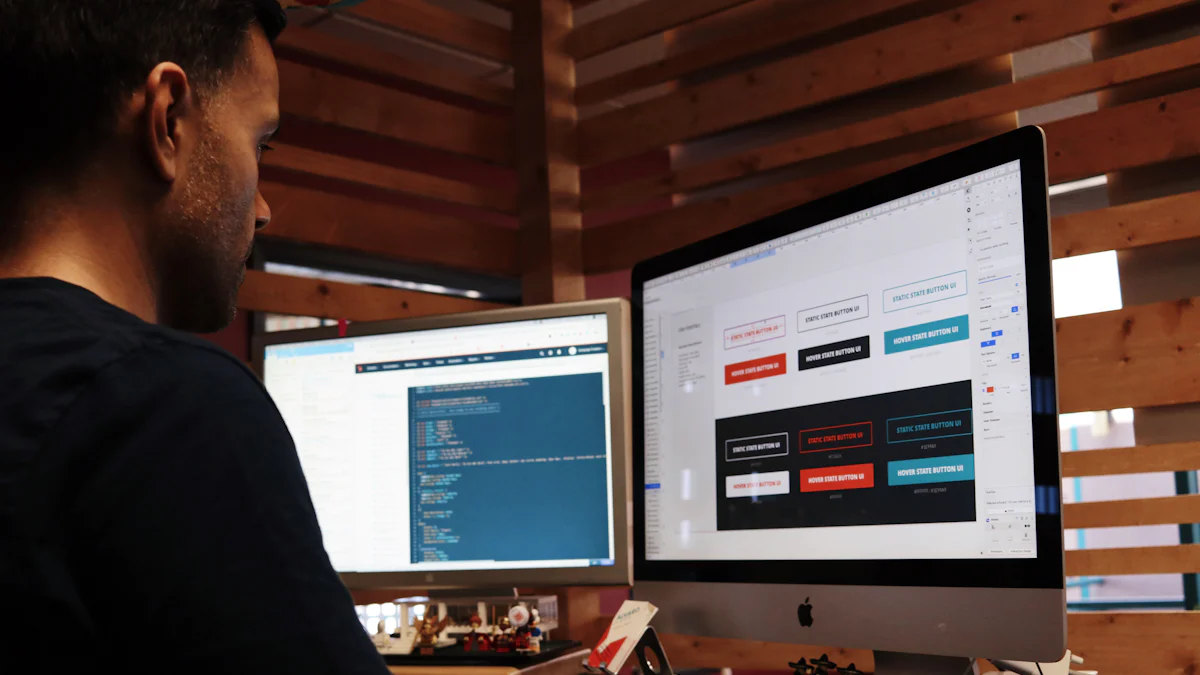What Certifications Are Available for SCCM Professionals in 2025
Try Aihirely for
Smarter Interview Prep
Experience real-time AI support tailored to your Resume.
Boost your confidence and ace every question with
AI Mock Interview.

Image Source: unsplash
Certifications for SCCM professionals in 2025 play a vital role in shaping your career. They validate your expertise and open doors to better opportunities. As IT systems grow more complex, companies increasingly depend on SCCM to manage their infrastructure. This reliance creates a high demand for certified professionals who can handle system and network administration effectively. The rise of virtualization and cloud technologies further highlights the need for skilled SCCM experts. By earning these certifications, you position yourself as a valuable asset in a competitive job market.
Key Takeaways
-
Getting SCCM certifications helps your career by proving your skills.
-
Certifications like Microsoft Certified: Endpoint Administrator Associate teach key skills.
-
These skills help manage devices and apps in today’s IT world.
-
The ITIL 4 Foundation Certification teaches how to manage IT services.
-
It helps connect IT services with what businesses need.
-
Learning new tech through certifications keeps you competitive in IT.
-
Using official guides, practice tests, and study groups helps you pass.
Certifications for SCCM Professionals in 2025

Image Source: pexels
Microsoft Certified: Endpoint Administrator Associate
Overview of the certification
This certification focuses on equipping you with the skills to manage and secure devices in a Microsoft 365 environment. It is ideal for professionals responsible for endpoint deployment and management. By earning this certification, you demonstrate your ability to implement modern workplace strategies and collaborate effectively with IT teams.
Key skills covered
The certification validates your expertise in several areas, including:
-
Managing devices and client applications using Microsoft Intune.
-
Deploying and managing endpoints across various operating systems.
-
Collaborating with architects and administrators to plan workplace strategies.
| Key Feature | Description |
|---|---|
| Device Management | Expertise in managing devices and client applications in a Microsoft 365 tenant using Microsoft Intune. |
| Endpoint Deployment | Implementing solutions for efficient deployment and management of endpoints across various operating systems and device types. |
| Collaboration | Working with architects and administrators to plan and implement a modern workplace strategy. |
| Skills Measured | Preparing infrastructure, managing devices, managing applications, and protecting devices. |
Exam details and prerequisites
To earn this certification, you must pass the Microsoft exam “MD-102: Endpoint Administrator.” While there are no formal prerequisites, familiarity with Microsoft 365 workloads and basic networking concepts will help you succeed.
Microsoft Certified: Modern Desktop Administrator Associate
Overview of the certification
This certification validates your ability to deploy, configure, and manage devices and applications using SCCM and Windows 10. It is designed for professionals who manage modern desktop environments in enterprise settings. Achieving this certification enhances your technical skills and boosts your career prospects.
Key skills covered
You will gain expertise in:
-
Deploying and configuring Windows devices.
-
Managing device security and troubleshooting issues.
-
Monitoring and maintaining device performance.
Exam details and prerequisites
To obtain this certification, you need to pass two exams: “MD-100: Windows Client” and “MD-101: Managing Modern Desktops.” Basic knowledge of Windows operating systems and SCCM is recommended before attempting these exams.
Microsoft Certified: Security, Compliance, and Identity Fundamentals
Overview of the certification
This entry-level certification introduces you to the core concepts of security, compliance, and identity management. It is perfect for SCCM professionals looking to expand their knowledge in these critical areas.
Key skills covered
The certification validates your understanding of:
-
Security, compliance, and identity concepts.
-
Microsoft Entra capabilities.
-
Microsoft compliance solutions.
Exam details and prerequisites
To earn this certification, you must pass the “SC-900: Microsoft Security, Compliance, and Identity Fundamentals” exam. No prior experience is required, making it an excellent starting point for beginners.
ITIL 4 Foundation Certification
Overview of the certification
The ITIL 4 Foundation Certification introduces you to the fundamentals of IT service management. It emphasizes aligning IT services with business needs. This certification equips you with the knowledge to manage tech-enabled products and services effectively. It also provides a framework for improving service delivery and customer satisfaction. ITIL 4 focuses on modern practices, including Agile, DevOps, and Lean, making it highly relevant in today’s IT landscape.
Relevance to SCCM professionals
As an SCCM professional, you manage complex IT infrastructures. ITIL 4 helps you understand how to optimize these systems for better service delivery. It fosters a strategic mindset, enabling you to navigate digital transformation challenges. The certification is globally recognized, enhancing your credibility in the field. Key benefits include:
-
A comprehensive understanding of IT service management principles.
-
Skills to manage and improve tech-enabled services.
-
A strategic approach to adapting to evolving IT environments.
Exam details and prerequisites
The ITIL 4 Foundation exam consists of 40 multiple-choice questions. You need to score at least 65% to pass. The exam lasts 60 minutes. There are no prerequisites, making it accessible to beginners. However, familiarity with IT service management concepts can be helpful.
Configuration Management II (CMII) Certification
Overview of the certification
The CMII Certification focuses on configuration management principles. It teaches you how to establish and maintain consistency in system performance and functionality. This certification is ideal for professionals involved in managing IT systems, including SCCM administrators. It emphasizes process improvement and effective change management.
Key skills covered
By earning this certification, you gain expertise in:
-
Configuration management principles and best practices.
-
Process improvement techniques for IT systems.
-
Managing changes while maintaining system integrity.
-
Ensuring compliance with organizational standards.
| Key Skill | Description |
|---|---|
| Configuration Control | Learn to maintain consistency in system performance and functionality. |
| Process Improvement | Master techniques to enhance IT system efficiency and reliability. |
| Change Management | Develop skills to manage changes without disrupting system operations. |
Exam details and prerequisites
The CMII Certification exam evaluates your understanding of configuration management concepts. It includes multiple-choice and scenario-based questions. The exam duration is typically 90 minutes. While there are no strict prerequisites, prior experience in IT systems management or SCCM can give you an advantage.
Benefits of SCCM Certifications in 2025
Career Advancement Opportunities
Increased job prospects
Earning SCCM certifications significantly boosts your employability. Employers value certified professionals because they bring validated skills to the table. These certifications demonstrate your ability to manage IT infrastructure effectively, making you a strong candidate for roles in system administration and IT management.
| Evidence | Explanation |
|---|---|
| Increased employability | SCCM certifications make candidates more attractive to employers, enhancing job prospects. |
| Validation of skills | Certifications validate the skills of IT professionals, making them more credible in their roles. |
| Knowledge for IT management | Provides essential knowledge for managing IT infrastructure effectively. |
| High demand for certified professionals | There is a growing need for SCCM certified professionals due to the complexity of IT systems. |
| Career advancement opportunities | Certification opens up a wide range of career roles and increases potential wages. |
Higher salary potential
Certified professionals often earn higher salaries compared to their non-certified peers. Employers are willing to pay a premium for individuals who possess specialized knowledge and can handle complex IT environments. By obtaining SCCM certifications, you position yourself for better compensation packages and long-term financial growth.
Industry Demand for Certified Professionals
Growing reliance on SCCM and MECM
The demand for SCCM-certified professionals continues to rise. Organizations increasingly rely on SCCM and Microsoft Endpoint Configuration Manager (MECM) to manage their IT systems. This reliance stems from the growing complexity of IT infrastructures and the need for robust management solutions.
-
Companies actively seek SCCM-certified professionals to fill critical roles in system administration.
-
The expansion of IT infrastructure, driven by virtualization and cloud adoption, has heightened the need for skilled SCCM experts.
-
Security concerns in IT systems further emphasize the importance of hiring certified professionals.
Employers’ preference for certified candidates
Employers prefer candidates with SCCM certifications because they bring proven expertise to the job. These certifications assure employers that you can handle the challenges of modern IT environments. As a result, certified professionals often stand out during the hiring process.
Skill Validation and Professional Credibility
Demonstrating expertise in SCCM
SCCM certifications validate your technical skills and knowledge. They prove that you can deploy, manage, and troubleshoot IT systems effectively. This validation enhances your professional credibility and builds trust with employers and colleagues.
Staying updated with the latest technologies
The IT landscape evolves rapidly. SCCM certifications ensure you stay current with the latest tools, technologies, and best practices. By keeping your skills up to date, you remain competitive in the job market and ready to tackle emerging challenges.
How to Prepare for SCCM Certifications
Study Resources
Official Microsoft learning paths
Microsoft offers official learning paths tailored to SCCM certifications. These resources provide structured content, ensuring you cover all exam objectives. You can access modules, videos, and hands-on labs to build your skills. These paths are ideal for gaining practical experience while preparing for the certification exams.
Books and online courses
Books and online courses serve as excellent supplementary resources. Many authors and platforms offer materials specifically designed for SCCM certifications. Look for books that explain concepts in simple terms and include practice questions. Online courses often feature video tutorials, quizzes, and assignments, making them interactive and engaging.
Training Options
Instructor-led training
Instructor-led training provides a guided learning experience. You receive personalized support from experts who address your specific needs. This method also includes real-time projects, allowing you to apply what you learn in practical scenarios. Flexible scheduling ensures you can choose sessions that fit your routine.
| Advantage | Description |
|---|---|
| Personalized Guidance | Tailored support from instructors for individual needs. |
| Real-time Projects | Hands-on experience with projects during training. |
| Flexible Scheduling | Ability to choose session timings that suit the learner. |
Self-paced learning
Self-paced learning gives you the freedom to study at your convenience. You can access recorded lectures, e-books, and practice tests anytime. This option works well if you prefer to learn independently or have a busy schedule. It allows you to revisit topics as often as needed.
Exam Preparation Tips
Practice tests and mock exams
Practice tests help you familiarize yourself with the exam format. They also identify areas where you need improvement. Mock exams simulate the actual test environment, boosting your confidence. Regular practice ensures you manage your time effectively during the exam.
Joining study groups and forums
Study groups and forums connect you with other learners. You can share resources, discuss challenging topics, and exchange tips. Engaging with a community keeps you motivated and provides valuable insights into exam preparation strategies.
Pro Tip: Follow these best practices to excel in your SCCM certification exams:
Create a study plan and stick to it.
Use trusted resources like Microsoft training and books.
Engage in real-time projects to test your knowledge.
Take mock tests and revise extensively.
Use mind maps for better retention.
Future Trends in SCCM Certifications

Image Source: unsplash
Integration with Cloud Technologies
Importance of Azure-related skills
Cloud technologies are reshaping the IT landscape, and SCCM certifications are evolving to reflect this shift. As organizations adopt cloud platforms like Microsoft Azure, the demand for professionals skilled in managing hybrid environments has surged. You need to develop expertise in Azure-related tools and services to stay competitive. These skills enable you to integrate SCCM with cloud solutions, ensuring seamless device management and enhanced scalability.
| Evidence | Explanation |
|---|---|
| Increased demand for SCCM certification | Organizations are adopting cloud technologies, leading to a need for certified professionals to manage these systems effectively. |
Azure-related skills also help you manage workloads across on-premises and cloud environments. This capability is critical as businesses transition to hybrid models. By mastering these skills, you position yourself as a key player in modern IT management.
Certifications focusing on hybrid environments
Certifications now emphasize hybrid environments to address the growing reliance on cloud technologies. For example, Microsoft certifications often include modules on integrating SCCM with Azure. These certifications prepare you to manage complex infrastructures that combine traditional and cloud-based systems. They also validate your ability to optimize performance and ensure security in hybrid setups.
Emphasis on Security and Compliance
Growing need for security expertise
Security concerns in IT systems have never been higher. Companies rely on SCCM to manage their infrastructure securely, making security expertise a top priority. As an SCCM professional, you must understand how to protect sensitive data and maintain system integrity.
-
There is a high demand for system administrators with SCCM certification due to the complexity and security concerns associated with IT systems.
-
Companies increasingly rely on SCCM for managing IT systems, necessitating staff with expertise in system and network administration.
-
The expansion of IT infrastructure and the adoption of virtualization and cloud technologies have heightened the need for SCCM certified professionals.
Certifications addressing compliance requirements
Compliance is another critical area gaining attention. Certifications now include modules on regulatory standards and best practices for maintaining compliance. These certifications are essential for IT professionals managing sensitive data or working in regulated industries.
| Aspect | Description |
|---|---|
| Target Audience | IT workers, administrators, engineers, and support staff using SCCM daily. |
| Demand for Certified Professionals | Increasing demand for SCCM certified professionals due to complexity and security concerns. |
| Role of SCCM Certified Workers | Assist organizations in managing IT systems cost-effectively and quickly. |
| Importance of SCCM Certification | Essential for overseeing IT systems and managing network configuration and software deployment. |
| Industry Trends | Demand has increased due to IT infrastructure expansion and the adoption of cloud technologies. |
By earning these certifications, you demonstrate your ability to navigate the complexities of security and compliance. This expertise makes you an invaluable asset to any organization.
SCCM certifications in 2025 offer you a pathway to validate your expertise and thrive in a competitive IT industry. These certifications prove your ability to manage complex IT systems, making you a valuable asset to employers. They also open doors to higher wages and better career opportunities.
By earning these credentials, you stay ahead of industry trends and demonstrate your commitment to professional growth. Start your certification journey today. Equip yourself with the skills and knowledge to excel in IT and secure a brighter future.
Tip: Begin with certifications that align with your career goals and build your expertise step by step.
FAQ
1. What is the best SCCM certification to start with in 2025?
If you’re new to SCCM, begin with the Microsoft Certified: Security, Compliance, and Identity Fundamentals. It introduces essential concepts and requires no prior experience. This certification builds a strong foundation for advanced SCCM certifications.
2. How long does it take to prepare for an SCCM certification?
Preparation time depends on your experience. Beginners may need 2-3 months, while experienced professionals might require 4-6 weeks. Dedicate consistent study hours and use official resources, practice tests, and hands-on labs.
3. Are SCCM certifications worth it for career growth?
Yes, SCCM certifications validate your skills and increase your job prospects. Employers prefer certified professionals for roles in IT management. Certifications also lead to higher salaries and opportunities in advanced IT positions.
4. Can I prepare for SCCM certifications without formal training?
Yes, you can use self-paced learning resources like Microsoft learning paths, books, and online courses. However, instructor-led training provides personalized guidance and hands-on experience, which can enhance your preparation.
5. Do SCCM certifications require renewal?
Yes, most certifications require renewal to stay valid. Microsoft certifications typically need renewal every year. Check the certification provider’s guidelines to ensure you meet the renewal requirements.
Tip: Stay updated with certification changes by visiting official websites regularly.
